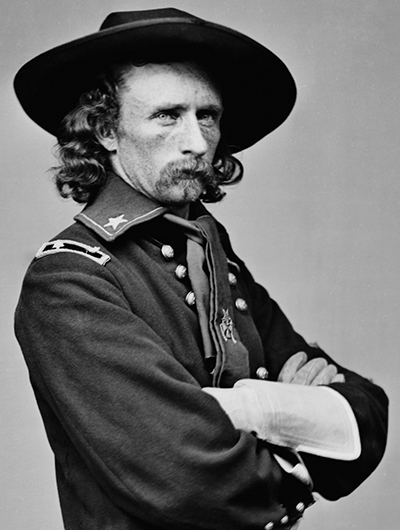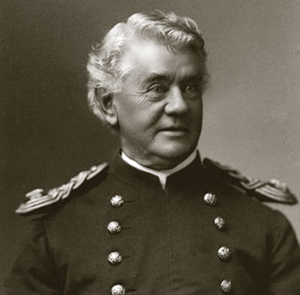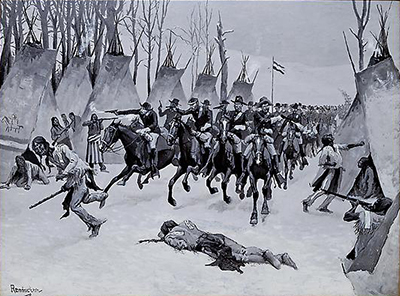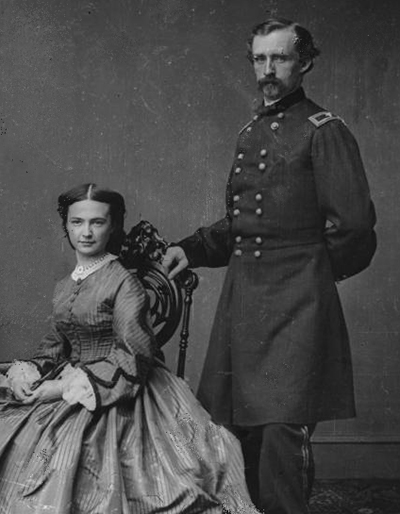Custer and the battle at Washita River.
The events of this day would reverberate for years.
Seven years before the Little Bighorn,
on November 27, 1868,
George Armstrong Custer attacked the village of Southern Cheyenne
Chief Black Kettle.
Settlers had been attacked, murdered and raped by Indian warriors.
The American government and public were demanding action.
Custer was sent to the area of the Washita River, in Texas.
This was 'the supposed seat of the hostile tribes'.
His orders were to destroy the village and kill the horses.
He was to kill or hang all warriors and
bring back all women and children.

It was extremely cold and the Indians felt secure from any attacks by soldiers.
Custer and his 700 or more soldiers and scouts came across a trail that they believed was made by Indian raiders.
The trail led to Black Kettle's camp.
It is now believed that the Indian raiders were not part of Black Kettle's tribe
and were just stopping by.
Black Kettle was a 'peace' Chief. He had realized the the white men
were not only here to stay but they were the rulers now.
He flew an American flag over his teepee; he had been
promised that it would protect him.
If Custer had done a proper reconnaissance he would have found that
just a few
miles upriver was a much larger and hostile village of Indians.
But, it was cold and the trail they had been
following led to this camp.
Custer divided up his forces,
just as he did seven years later at the Little Bighorn, and attacked the village
at daylight.
It was a small camp and Custer had over-whelming military superiority.
The battle was basically over in minutes.
Chief Black Kettle and his wife were killed.
There was an attempt to save the women and children but some of them were killed.
(It has been suggested that many of the atrocities were committed by Custer's Osage scouts).
About this time, Major Elliot and seventeen men,
rode off to chase down some escaping Indians...
It took a couple of hours more to flush out warriors and non-combatants from hiding places.
Fifty-three women and children were gathered up. The horses were shot.
During this time, no one heard guns firing from about two miles away...
At this time, Lt. Godfrey and some of his men rode down river.
When they came to a ridge they saw
a much larger village and an estimated
one-thousand Indian warriors riding toward them.
Alerting Custer to this, the soldiers quickly began preparations to leave the area.
At this point, it was noticed that Major Elliot and his men had not returned.
A small search party under Captain Edward Myers was dispatched, but as Custer later said,
'It was only an hour before sunset and there were
hostile Indians all around us.'
Custer had the safety of his command to consider.
The search party was called back. The fact is, however,
that an actual search did take place; there was just not enough time to conduct a thorough one.
It was discussed that maybe Major Elliot, finding himself cut off by the advancing Indians,
had merely decided
to take a detour and meet up with Custer
on the road back to the supply camp.
Some of the troopers thought the worst, that Elliot and his men were dead.
Enter Captain Frederick Benteen.
He angrily denounced the decision to 'abandon' Major Elliot.
Benteen was a friend of Elliot's. The fact is, Custer also liked Elliot.
Benteen later wrote an article which was published in a newspaper. The article
attacked Custer's handling of the
Washita battle and his abandonment of Major Elliot and his men.
Custer was outraged; Benteen admitted that he had written it.
Custer knew right then that he had a serious
enemy.

Captain Frederick Benteen.
It was difficult in those times to make rank.
After the Civil War, the military was greatly downsized.
There was a lot of animosity among the officer corp because it was hard to get a rare promotion.
Benteen was a captain during the battle of the Washita River
and seven years later at the Little Bighorn, he was still
a captain.
Another complaint that Benteen had was the same complaint that other officers would have with
Custer.
He would routinely fail to mention their accomplishments (recognition) on his reports.
This was very helpful, perhaps even necessary, for an officer to get a promotion.
Custer had become the youngest Brigadier General during the Civil War, because of his name being mentioned in reports.
Custer said that it would be unfair to single out a few when all of his soldiers had performed well.
The failure of Custer,
concerning these reports and other shortcomings,
would contribute to many of his officers and soldiers hating him.
The Seventh Cavalry was divided in 1868
and it would be even more so... at the Little Bighorn.
Custer and his soldiers were being surrounded by the Indians from up river.
He pulled a fast one and headed the Seventh Cavalry up river toward the larger village.
The Indians thought he was going to attack their homes
so they pulled back to form a defense of
their families.
But as soon as it got dark, Custer turned everyone around
and the soldiers and their captives
returned to the safety of their camp.
Two weeks later, the bodies of Elliot and his men were found.
They had encountered a large number of Indians and were all killed.
Custer's official report of the Washita battle showed that 103 warriors were killed.
This is completely inaccurate.
(Perhaps Custer realized that this was far from being a victory?)
The Indians say that less than forty Indians were killed, of which less than twenty were combat warriors.
Regardless, the newspapers reported this as a major victory and Custer was called 'a great Indian fighter'.
The newspapers were looking for a hero and Custer (or his press agent) was there to help.
To be sure, there were those in America who condemned the battle as a massacre of peaceful Indians.
Chief Black Kettle was basically where he was supposed to be.
Today, looking back, the battle was just another one of the atrocities
that were committed against the original Americans.
It has been asked, 'Why didn't Canada have the Indian wars as we did?'
The answer is that Canada kept its promises with the Indians.
Canada didn't cheat the Indians as we did.
Canada treated the Indians decently.
When Custer died at the Little Bighorn, the British press
badmouthed
and condemned the Americans for the way that we had treated the American Indians.

Here is a painting by Frederick Remington of the battle.
It shows Custer leading the Seventh Cavalry at the battle of the Washita River.
Something else happened at the Battle of the Washita River...
Fifty-three women and children had been taken captive.
One of the women had a deep impact on Custer. She was reported as being beautiful.
Her name was Me-oat-ze and also known as Mo-nah-se-tah .
She was pregnant at the time and had the baby.
Custer was attracted to her.
During 1869, she had another baby. Many people think that it was Custer's.
He may have also, according to Indian lore, 'married her'.
Custer may not have realized
that he married her, but that's the story.
Many historians believe that something indeed, did happen between the two.
Benteen, who never missed a chance to badmouth Custer,
said that the two had lived together during the winter of 1868-69.
(No mention of where Custer's wife, Libbie, was at the time).
(Benteen also referred to Custer's 1874 autobiography,
'My Life on the Plains'
as 'My Lie on the Plains'.)
His brother, Tom, who died with him at the Little Bighorn,
said that she was a favorite of the soldiers.
This could mean a couple of things.
Maybe they liked her because she was Custer's girl,
and maybe they really liked her. Maybe her baby was not Custer's.

Custer's wife, Libbie, met Me-oat-ze (Mo-nah-se-tah).
She knew her husband respected and admired this young Indian woman.
Whether she had any other ideas we will never know.
No one knows what became of the baby.
The feud that began at the Battle of the Washita River between Custer and Benteen would continue.
Seven years later, at the battle of the Little Bighorn...
Custer divided his troops before the battle.
He ordered Captain Benteen to take the men under his direct command
and go off in search of Indians trying to escape.
Benteen said to Custer (and there was a witness),
'Perhaps
we should keep the companies together,
if there are as many Indians as our scouts are reporting.'
Custer replied, "You have your orders."
It is believed that Custer was so confident of himself,
so sure that the Indians would break and
run
when his soldiers attacked, that it would be a great victory.
He didn't want Benteen to share in the glory.
Years later, Custer's Indian 'wife' Me-oat-ze, told a friend that
she was heartbroken when she heard that Custer had been killed...
Custer has been called many things.
Whether you like him or hate him,
his story is fascinating.
There are many things that I would have liked to put on this webpage
but it would have been too long and difficult to read.
My research involved several books on Custer,
various internet articles and a couple of YouTube videos.
I began with the idea of writing about the Little Bighorn battle,
but realized that certain elements of that battle
began seven years earlier, at the Washita River...
Amazon
His aviation successes, Vegas casinos,
his power, his downfall... and his women.
Howard Hughes and the Stars of Hollywood



